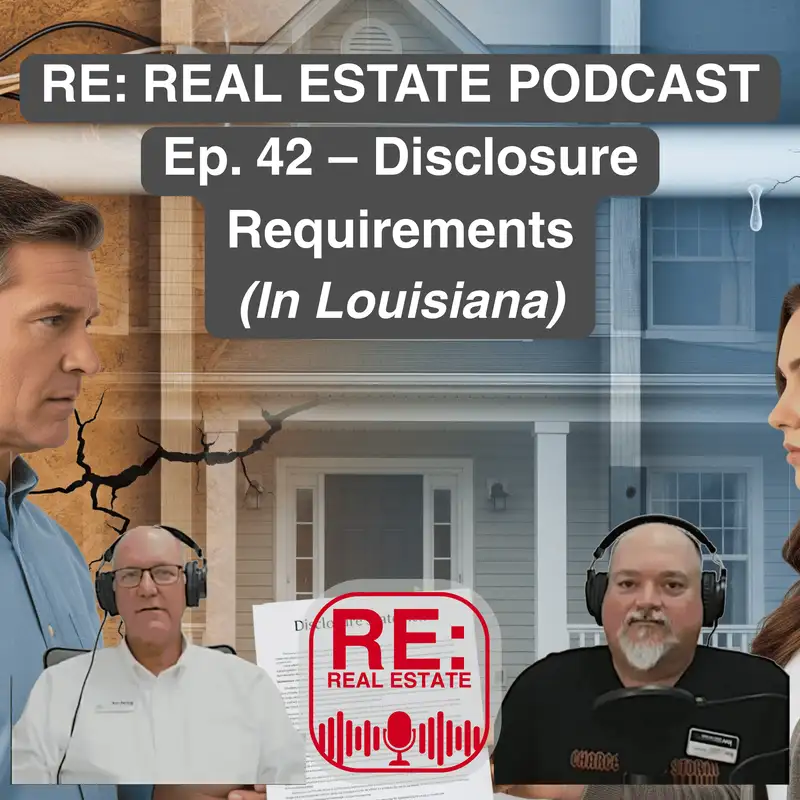Ep. 42 - Disclosure Requirements
Ben Harang, REALTOR® (00:19)
Hello everybody. And welcome to another episode of Ori real estate podcast. I'm your cohost, Ben Harang along with my cohost, Clint Galliano. Good afternoon, Clint. How you doing today,
Clint C. Galliano, REALTOR® (00:32)
I'm doing wonderful, Ben. How you doing?
Ben Harang, REALTOR® (00:34)
doing terrific. We got a little rain earlier today. Looks like we might get a little more this afternoon. Just cool things off in the middle of summer. Those things happen. So just another day in paradise, right?
Clint C. Galliano, REALTOR® (00:47)
Yes indeed.
Ben Harang, REALTOR® (00:48)
All right. So what are we talking about today, big one?
Clint C. Galliano, REALTOR® (00:51)
Disclose, disclose, disclose. It's common advice, but it depends.
Ben Harang, REALTOR® (00:57)
Yes, it does. Yes, it does.
Clint C. Galliano, REALTOR® (01:02)
All right, so common advice you hear in real estate and really from legal minds. We had some lawyers speak at a team meeting last week and their mantra is disclose, disclose, disclose. It's always good because you can never be accused of hiding anything if you disclose everything.
Ben Harang, REALTOR® (01:25)
Mm-hmm.
Clint C. Galliano, REALTOR® (01:25)
but there's kind of a, I guess a fine line or a definition on what you should disclose and what doesn't need to be disclosed. Anything pertaining to the property, the physical traits of the property as far as deficiencies or anything like that.
you need to disclose. In fact, we've talked about it. We've got special forms to disclose the condition of the property and all that stuff. Anything that, in Louisiana, anything that a seller knows about the property that's a defect needs to be disclosed. So those are things that are required to be disclosed, and you should disclose it. There are other things that are not required to be disclosed.
Things like if someone died in the home, if someone was murdered in the home, if someone committed suicide in the home. Those things are not required.
then you get to the personal side, things about buyers or sellers that unless they give you permission to disclose it to the other parties or to anybody, you should not be disclosing that at all. That's confidential information and that...
that that's things that should not be shared with anyone unless you've got to express permission to share. And so that's kind of the position that we hold and that's the advice that we give and that's what we tell our clients. That's the mode that we operate in.
Ben Harang, REALTOR® (03:03)
So let's, let's, let's drill down a little bit about psychologically impaired property and why and why, why it should or should not be disclosed. you know, we want to, we need to disclose about a faulty roof, faulty electrical, faulty plumbing, AC doesn't work. Water heater doesn't work. Floor is torn. house had termites, whatever, whatever it is.
Those things have to be disclosed because it affects the property itself. What we call in Louisiana as psychologically impaired property, which is if somebody passes away in the house by whatever means, it's natural causes, murder, suicide, it doesn't matter. Those events do not need to be disclosed specifically in state law. says it.
They do not need to be disclosed because it does not impact the physical property itself. some people may be uncomfortable with any one or all three of those events happening. And if you're in the market to buy a house and you, you want to know if somebody passed away in it, you can, you can ask your agent to find out. and they can ask the listing agent.
And the listing agent may or may not have permission to, to confirm or deny what happened. You can, we have the internet and things are hard to hide on the internet. if, it, the neighbors know everything about the house. yeah, yeah. And they'll be glad to tell you about the house and glad to tell you about any event that happened at the house from their perspective.
Clint C. Galliano, REALTOR® (04:25)
or you can talk to the neighbors.
Ben Harang, REALTOR® (04:38)
But just because they said, doesn't mean it's true. Some version of it may be true, but asking the neighbors is absolutely a good idea. I've seen neighbors walk across and say, you know that house had three feet of water in it? said, well, they told us it had a couple of inches one time. Oh, no, that's not what you know. You don't know what you're to find out when you talk to the neighbors.
And if you hang around outside long enough, some, some neighbors going to walk outside and start sweeping his sidewalk or carport or driveway or watering his flowers or her flowers. And they're going to want to know who you are. They want to know about you if you're to be their neighbor. So they're really easy to engage in conversation. But the bottom line is.
Clint C. Galliano, REALTOR® (05:19)
So Miss So-and-so
is gonna be moving.
Ben Harang, REALTOR® (05:22)
Yeah. Why, why they move? I didn't know they were moving. but the bottom line is psychologically impaired property is not required to be disclosed. The seller can choose to disclose whatever they want, but then they're bound by law to disclose it. It's nowhere on the property disclosure form issued by the real estate commission. they, they decided a long time ago, they want to stay out of that, that area of disclosure.
They don't say you can't disclose it. They say you don't have to disclose it. So that's just a way to find out if it bothers you and it bothers some people, some people it doesn't bother at all. So do you do diligence and you can find that out in an inspection period. And just because it's not disclosed, if you find out something during the inspection period that you're not comfortable with, you can pull a plug right then and there.
Clint C. Galliano, REALTOR® (06:11)
This is true. It's a basically the inspection period and due diligence and inspection period is for you to investigate everything about the house and if you find something you don't like about it, whatever it is, then that's your contingency to get out.
Ben Harang, REALTOR® (06:27)
Mm-hmm.
So the Clint and I and I were talking earlier about somebody's personal situation, you know, whether you're having financial trouble, whether you're going through a divorce separation or whatever, whatever the case may be, those personal situations absolutely do not need to be disclosed and should not be disclosed in my mind to the other party because it puts you at a disadvantage in the negotiation with that.
party, whether you're on the buyer side or seller side. you know, had a sort of house to somebody. There was a house that came up across the street directly across the street from, her parents and had a different last name. So when we went to see the house, I set them up. told them, said, tell your parents, don't come outside. They don't, we don't want to engage them while we're here. we don't want.
the seller or the other sellers agent to know your parents live across the street and your sister lives three doors down. Because that puts you at a disadvantage in the negotiations. They can find out that after we make a deal. But it could be used to your disadvantage during the negotiations if they understand the personal situation that you're going through at the time, whether you're the buyer or the seller.
Clint C. Galliano, REALTOR® (07:48)
Yeah, if you're going through a divorce and you're selling your home.
you may not want that to get out because a savvy buyer's agent may use that and know that you're needing to sell and want to sell and may be more likely to accept a lower offer just to get the thing settled. So those are things that you may not want to have disclosed to buyers.
Ben Harang, REALTOR® (08:11)
Mm-hmm.
And depending when, if it involves a divorce and it happened last week, there's no public record of it. So it shouldn't, it doesn't have to be disclosed. It can be disclosed if the seller's wanted to, but it doesn't have to be. Once it becomes public record, anything can be disclosed. You're not putting your seller or your buyer in harm's way or at a disadvantage if it's in the public record.
you don't have to broadcast it, but if it's there for the public to see, then it's there for the public to see. And has no expectation of privacy. So if, the divorce happened two years ago, the idea that they were divorced, everybody in the neighborhood knows whoever it is is divorced now. so it's a matter of timing too. And then it becomes not a big deal that there was a divorce.
So that's, nobody's trying to hide anything. It's just what, what legally has to be disclosed and what's not required to be disclosed. And again, the seller can disclose anything they want over and above what the, the disclosure requires. just, just like, and Clint and I didn't talk about this, the disclosure we use, there's some exceptions. If,
If there's an estate that's selling it or a succession, they're not required to complete the disclosure. But there's an option that says we're not required to complete it, but we'll complete it to the best of our knowledge. And I think that's an extremely dangerous position for anybody to put themselves in. And I may be in a minority about that, but you start offering something that's not required and it can go south on you in a hurry.
So if it, if it's required to be disclosed, absolutely will disclose it. If it's not required to be disclosed and it doesn't affect the property, you don't, I don't think you want to, you want to disclose it. because you may not know enough about the property about you heard something happened if you inherited the property, but you were not there when Hurricane Ida came and you heard how bad it was. And the house might not have been affected at all, but
Somebody in California might say, that house went through Hurricane Ida and it hurt. was bad. So they must've had some damage. If you don't know, don't disclose it. If you're not required to disclose it, my advice is don't disclose anything. If you know the house had a fire 10 years ago, you might want to tell them they had a fire in the house 10 years ago, even though you're not required to just to be fair and honest about it. But things that you really don't know about or sure about.
Just don't open a can of worms.
Clint C. Galliano, REALTOR® (10:54)
Nah, I generally advise in situations where they're not required to fill out the disclosure to put stuff that they know about. If they don't know about it, I tell them to leave it blank. Because that's, if you don't know about it, don't make shit up.
Ben Harang, REALTOR® (11:10)
Right. And, and, you know, if, an executor of an estate, completes it, they could be adversely affecting the other members of the estate by disclosing something that was not required to be disclosed like psychologically impaired property. They might, lose a sale because somebody just doesn't, they might not have a thought about it. And
It might've, it might've gone through and then you, you say something happened in the house and they could say, I'm not buying it was it really doesn't affect the condition of the house. affects the, the psychologically acceptable acceptance of the house from the buyer's perspective, maybe. and you never know what goes on in their heads, you know,
Some people are just scared to death of it. Some people just couldn't care less. And that's up to each individual buyer.
Clint C. Galliano, REALTOR® (12:07)
Storytime.
Ben Harang, REALTOR® (12:08)
Go ahead.
Clint C. Galliano, REALTOR® (12:10)
The, and this wasn't one of us, but it was a former colleague of ours had a property listed. Well, I don't remember if, fairly sure she had the property listed and somebody brought the buyer. They were under contract and they had to jump through hoops to get the buyer approved for financing and we're working on the loan and everything.
Ben Harang, REALTOR® (12:35)
Mm-hmm.
Clint C. Galliano, REALTOR® (12:37)
and a lovely neighbor, well no, take that back, it wasn't a neighbor, but somebody told the buyer that...
someone might have been murdered in that home. There was no evidence. It was never stated. But the person that was suspected of murdering somebody and the body wasn't found there, it was found somewhere else, dumped off if I remember the story correctly.
Ben Harang, REALTOR® (12:51)
Mm-hmm.
Clint C. Galliano, REALTOR® (13:06)
So there was no hard evidence that the person was killed there, but the person that did the killing lived there at some point. And I mean, this went on for like six months, tried to work through the financing and get everything done. And then the buyer finds out about this and then it went on for another couple of months and then they walked away.
Ben Harang, REALTOR® (13:10)
Mm-hmm.
Mm-hmm.
Yeah.
Clint C. Galliano, REALTOR® (13:31)
because they didn't want to live in a murder house, even though there was, you know, was all rumor and conjecture. But there was nothing, nothing saying, yeah, this happened here.
Ben Harang, REALTOR® (13:37)
Right. Right.
And and I don't know that I've dealt with a murder in the house I've dealt with suicides on a couple of occasions and It bothers it bothers some people a lot some people it doesn't at all You know, was telling Clint I had one that They found out about it. I didn't know anything about it After the house was under contract and they called me up and said, what do you know about it? I said, I don't know anything
So find out what you can. I called him up. I called the listing agent and he said, yeah, her husband, committed suicide in the house and now she's selling the house. There's nothing wrong with the house, but that's the, that's the truth. And I went back to them and told them what happened. for a minute, I didn't think they were going to buy the house because of it. And they, they decide to, they did decide to proceed with the sale under,
conditions that they were going to do after the after they bought the house and they they felt comfortable But it was not required that it be disclosed and we had a difficult conversation With one of the buyers relatives About why they didn't know about it and I had a difficult time explaining to him that we didn't know about it because it's not required that that be disclosed because it doesn't affect the condition of the property and
For people that that are bothered by it, it's, it's, it's hard to understand why, why would you not disclose that? you know, but the legislature decided that's not something that needs to be disclosed. They don't want to get in the middle of that. cause you talk about the Clint story about the, the innuendo about where it happened. Did it really happen in the house or not? You might be telling them something that you believe is true, but it might be completely wrong.
So if it doesn't affect the brick and mortar of the house itself, then it, it's not required to be disclosed. If the seller wants to disclose it, they can.
And that's that psychologically impaired property.
Clint C. Galliano, REALTOR® (15:34)
That's it in a nutshell. That's a big nutshell. It is.
Ben Harang, REALTOR® (15:38)
That's a heavy topic there, Clint.
There's other stories that have a little dark humor on them that probably shouldn't get into. But things happen, and if it doesn't affect the property itself, it really doesn't matter.
know, because somebody could pass away of natural causes in the house. And some people that if they know that they don't want to buy the house. So from the seller standpoint that you're limiting the buyer pool by disclosing it when you're not required to disclose it. And the argument would be, well, you should disclose it anyway, because you don't want somebody buying it that's bothered by it. And they find out about it two years later. And I don't disagree with that.
but I
It just, the psychologically impaired property is not required to be disclosed. And that's the, that's the bottom line.
Clint C. Galliano, REALTOR® (16:24)
Yeah.
And that's what I was going to say is that there are no rules or laws requiring that it be disclosed. So it's not a requirement. you know, I've...
Ben Harang, REALTOR® (16:37)
Right. Which is
why I'm not a fan of offering to disclose stuff if you're not required to complete the disclosure. There's a reason you're not required to complete the disclosure. And I just think it causes extra angst for some people. you, try to, you do the right thing. And if you know the house had three feet of water in it and you're not required to disclose it, you ought to tell the agent.
tell them it had three feet of water in it. But if there was an event that happened in the house that doesn't impact the physical properties of the house, I don't see any reason to disclose it.
Clint C. Galliano, REALTOR® (17:14)
Alright Ben, I think we've covered disclosures pretty well. We told at least one story.
Ben Harang, REALTOR® (17:20)
Uh-huh. Well, we each told the story.
Clint C. Galliano, REALTOR® (17:23)
Yeah. So, I'd to thank everybody for listening and invite you to like, comment, share, tell all your friends, and go to rerealestatepodcast.com. You can ask questions there. You can watch a video there. You can listen to the audio or subscribe from your...
favorite podcast app. Tell people about us, share it with everybody, help us to promote it. We figure we're the best podcast in the home of Tibbetto area dealing with buyers and sellers of real estate.
Ben Harang, REALTOR® (17:58)
No doubt.
And if you, if, if you go through the playlist, you know, Clint and I have, I don't know, in excess of 35 years combined in this business. so we don't know it all. I learn stuff every day. but you can learn from some of the mistakes we've made in the past, some negotiating strategies, some pricing strategies, some staging strategies, some marketing strategies.
pricing strategies, just, you can get the benefit of that experience. when, you just spend a little time on the podcast, and listen, if you have any questions that we don't cover, get in touch with us, call, text, email, whatever it is. All right. I'm done.
Clint C. Galliano, REALTOR® (18:41)
All right.
All right, Ben, have a good one.
Ben Harang, REALTOR® (18:43)
All right, y'all too. We'll see you next time. Thanks.
Creators and Guests



